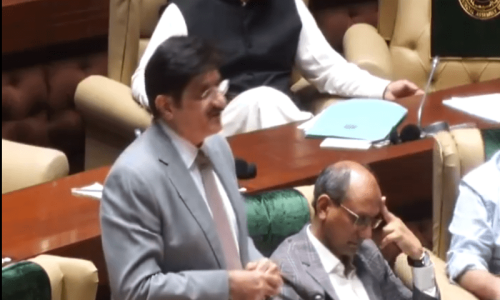KARACHI: Every year 400 to 500 new cases of leprosy are registered in Pakistan and it is likely that the same situation will continue for two more decades, said experts at a press conference held on Saturday at the Marie Adelaide Leprosy Centre (MALC) on the eve of World Leprosy Day.
They underlined the need to create public awareness to minimise the burden of the disease.
Speaking about the challenges being faced in tackling the disease, Dr Ruth Pfau, the MALC founder, said though efforts for the eradication of leprosy had been successful, it was not the end of the struggle.
“There are many challenges, especially the ones in the form of physical and social rehabilitation, which will continue even after the elimination of the disease,” she said, appealing to the people to shun the stigma attached to the disease.
Dr Pfau commended commitment of her team and said the struggle against the disease could not have been successful without their dedication to the cause.
Sharing some statistics on the disease, Dr Ali Murtaza, director for training at the MALC, said more than 56,780 leprosy patients had registered at the centre since its establishment in 1956.
“Most patients are treated free of cost at the 157 MALC leprosy centres set up across the country. Besides leprosy, the centre is also working to eliminate tuberculosis and blindness in Pakistan,” he said.
Explaining the reasons behind the increase in the number of leprosy patients from 66 in 2013 to 133 last year in Sindh, Dr Murtaza said it was probably because of active surveillance that led to the discovery of such cases.
“A complete elimination of the disease is a challenge, since it’s a chronic one and patients often remain unaware of its presence till it progresses and affects various organs of the body,” he said, adding that the disease’s incubation period which normally ranged from three to five years could be even 40 years in some cases.
Citing some MALC data, Dr Mervyn Lobo said that positive developments were continuing and the leprosy prevalence rates in the country were below the WHO recommended threshold, between 0.27 per 10,000 population in Karachi and 0.04 in Azad Kashmir, and were decreasing further.
According to experts, only Punjab, though a low-prevalence area, was showing an increase in the number of leprosy cases.
Karachi, they said, was a focal point where patients from other parts of the country as well as Afghan refugees came for treatment.
They appealed to doctors, especially dermatologists, to cooperate with the MALC and refer leprosy patients to it.
“Leprosy is completely curable with multidrug therapy if diagnosed early. Untreated leprosy can cause progressive and permanent damage to the skin, peripheral nerves, limbs and eyes,” said Dr Murtaza in reply to a question.
Published in Dawn January 29th, 2017














































Dear visitor, the comments section is undergoing an overhaul and will return soon.